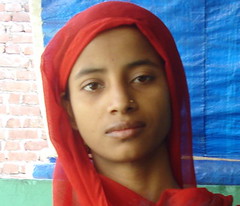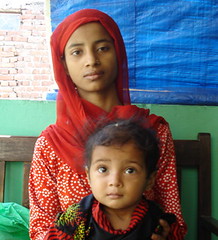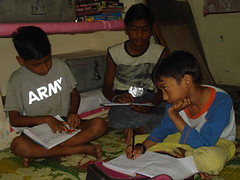
by Anuradha Bakshi | Apr 30, 2007 | girl child

Modigliani could have painted her. Were she a few inches taller she could have walked the ramp. But little Mahajabi’s mom was born in a poor Muslim family in India a land where little girls are not welcome, a land where they are often done away with, a land where they just go missing.
Their fate if they do survive is no bed of roses. Mahajabi’s mom does not even know her age but seems barely out of her teens, but unlike her peers in well to do homes or other lands, she looks used and abused. She has five children the eldest 5 and the youngest 10 months. She must have been married at a time when girls are normally carefree and got pregnant soon after. Since, her life has been spent being pregnant and breastfeeding while caring for her ever growing family. In her world any form of birth control is sinful and blasphemous. As long as her body is capable of bearing children she will continue doing so. She has no choice. Hers is a life devoid of rights; just a string of duties defined by traditions and mores made and defined by men.
Her husband is a daily wage labourer and barely earns enough for his family. Mahajabi’s heart condition has come as a bolt from the blue and thrown the family out of gear. And yet she is a mother and cannot remain silent so she has moved in with her parents till the child is attended to and healed. With a courage and determination well beyond her years, this woman who does not know her own age, requested her neighbour to accompany her to the hospital as the child was sick. She had dropped by to ask us for some proof she could show the doctors who had earlier refused to attend to the child as they must have thought that this poor family could never gather the required 60 000 Rs.
But they were unaware of the power of a mother’s prayers and the ways of the God of Lesser beings who is beyond religion and faith. Mahajabi will have her operation and will be given a chance to live.
But as one watched them leave, one wondered how long would little girls have to wait before they were given their rightful place in society.

by Anuradha Bakshi | Apr 29, 2007 | two indias
 I met Mallika on the net a year or so ago. It was a time when we were desperate for funds and I use to knock at every id or site in the hope of getting some help. A common net friend connected us and as luck would have it she came to Delhi and we met.
I met Mallika on the net a year or so ago. It was a time when we were desperate for funds and I use to knock at every id or site in the hope of getting some help. A common net friend connected us and as luck would have it she came to Delhi and we met.
The next day she came by to visit project why with her parents and her two daughters. It was a blessed moment and since they have supported us in more ways than one.
That was time her first book had been published and even though I was past the age of young motherhood I tried to find a copy of 100 promises, thinking it would be a way of getting to know Mallika better. I must confess that I was utterly surprised by the wisdom and sagacity that permeated this tender book and found myself reading it with intense pleasure, regretting that in our days such books did not exist. Dr Spock or Laurence Pernoud was what we read as we went on learning to be and making innumerable and iretreivable mistakes.
More than a book on motherhood, it was a reflection on life itself and a celebration of the often neglected link between a mother and a child. I saw my mistakes and shortcomings andadmired wondered the depth of understanding of this young mother. Many of the promises were shared with my teachers as maybe I was lucky to have been given a second chance with the project why children. And of all the promises the one that touched me the most was: I will hold you, but never hold on to you.
Imagine my surprise an delight when I received a mail from Mallika where she introduces her new book 100 questions from my child and writes: For this book, I am donating a portion of my proceeds to ProjectWhy, an organization in New Delhi that provides educational programs for underprivileged children.
What makes this gesture special is that project why is about trying to find answers to the innumerable questions that come up when looks at the plight of the children of India. I am sure that once again it will guide me in finding the right answer.
Thank you Mallika.

by Anuradha Bakshi | Apr 27, 2007 | two indias
 Her name means beautiful and Mahajavi is undoubtedly beautiful. She is just under one. She was born with a hole in her heart that needs fixing.
Her name means beautiful and Mahajavi is undoubtedly beautiful. She is just under one. She was born with a hole in her heart that needs fixing.
The youngest of 5 kids – though her mom looks like a kid herself – she has a right to live a full life but cannot unless her heart is fixed.
You guessed right, Mahajavi is our new inmate at heartfix hotel and we hope to be to fix her heart.
This is how she landed at project why.
Mahajavi is related to the two men who came by my home to do some work last week, probably part of a large plan of the God of Lesser Beings. An answer to a young mother’s prayer or a reminder that in our land every little girl has a right to live? Who knows.
In Delhi little girls are precious even if many do not know it as yet. I read some chilling figures in a recent publication: 25 000 girls go missing every year in this very city. hence it is a matter of celebration that a poor family with 5 children is fighting for little Mahajavi. Before we met them, they had made innumerable visits to the All India Institute of Medical Sciences and done what they could. It is divine justice that they found us. Now the ball is in our court and the game has to be won.
To some it may seem pointless to save such a life as they may wonder what her future would be. I chose to leave such souls to their wonderings. A simple glance at her eyes and at her young mother’s eyes is sufficient to know that Mahajavi’s life is as precious as any other little girl’s. As so her future only time will tell..

by Anuradha Bakshi | Apr 27, 2007 | Uncategorized

A few posts back we shared some of our achievements with a sense of pride. Today I was given another set of statistics and once again one felt elated.
My mind travelled back almost 10 years when project why began, or rather when the organisation was set up. To me it was a question of paying back a debt but at that time the canvas was blank and our work could have taken on any direction. The first year was spent distributing nutrition to slum children and in the course of that year one set out biscuits in hand on a journey into an unknown world, or rather a world one had been conditioned to view in a particular way. With each biscuit came a lesson and a set of questions or ‘whys’.
The one why that disturbed me the most was: why do children drop out of school? Project why came as our answer to this question and one can say with a some satisfaction that since its inception children who have come our way have remained in school and performed well. This year again we have has our set of toppers in many classes.
The other why that was as disquieting was the alarming number of children in Delhi who are not in school – over 100 000 between the age of 7 and 13 – . So it has also been our effort to try and push children back into mainstream education. This is often a difficult task as one has to motivate parents and bully schools. This year again 6 children were admitted n class VI and 61 in different primary classes.
Cynics may think this is but a drop in he ocean and I agree, but drops create ripples. In a land has huge as ours the only way to be able to bring change is one child at a time, one day at a time and to believe that if one life is changed a real difference has been made.
by Anuradha Bakshi | Apr 25, 2007 | reservations, two indias
Last week two men came to help us with some work at home. Like many others who eek their living on a day-to-day basis they were picked up from the chowk or road side where they sit from the early hours of the morning in the hope that someone would come by and give them work.
Both had lost their jobs in factories, as many do in Delhi, but had refused to lose hope. Over a cup of tea they shared their story in a dispassionate way. Hazari the elder of the two hails from Bihar and has five children. His wife does not work and it is his measly 3000 rs that keeps them going. All his children go to school and his elder daughter is in class IX. His dream is to ensure that she completes her XIIth.
Hazari belongs to one of the reserved classes but has no idea of what that simple appartenance can get him. He has never heard of reservation and has never availed of any of the sops doled out regularly. His day-to-day survival does not give him the luxury of taking time off to get the required papers ratifying his social or economic status. Yet Hazari refuses to give up his dreams for his children, the very reason he left his home to come to this soulless city.
It was poignant to see that this conversation was happening at the very time when heated debates on reservations are once again dividing the nation and the fate of the creamy layer is being veted. This man like many others in our land was just busy surviving and holding on to his dreams. He is already a winner as he has beaten many odds. In a city where children drop out with alarming regularity, his daughter has held on and made it to class IX.
As I mused on about this innocuous meeting, I came across a news item stating that an IIM alumni body had gone to the Supreme Court questioning the validity of a 56 year old caste-based reservation system. What caught my eye were two quotes of from Jawahar Lal Nehru. The first reminded us of his dream of a ” young and vibrant nation, free from the vices of caste and communal divide“. The other went on to state: ” I dislike any kind of reservation. more particularly in services. I react strongly against anything that leads to inefficiency and second rate standards. I want my country to be a first class country in everything. The moment we encourage the second rate we are lost“.
A mere glance at today’s India 60 years after freedom shows that Nehru’s vision has been long forgotten. The debate on the creamy layer is sufficient to show that the very purpose of reservation or affirmative action has been defeated. While the battle rages about the 27% OBC reservation in institutes of higher learning, 6 decades of Independence have not been able to enforce the right to primary education.
It stands to reason to believe that for any affirmative action to be honest, excellence has to begin at the very bottom of the ladder: ie in state run primary schools. Our tiny experience at pwhy has proved beyond doubt that children from underprivileged backgrounds can be stellar performers if given a little help. To cite just one example, Farzana a two times failure in class VII got 83 % at her Xth Boards. Sadly as debates go on, the state of municipal schools in India’s capital city seem to be getting worse by the minute. A mind boggling number of potential aspirants to higher learning drop out of schools because somewhere down the line each one of us has failed them.
The IIM alumni effort is one in the right direction. It is time to define the validity of a reservation policy that seems to be doing more harm than good, as it is fracturing our society with impunity. Any affirmative action has to be time bound. Otherwise it will lead to impairing rather than helping. Alas, as long as such policies provide fodder to vested interest, solutions will be difficult to find.





